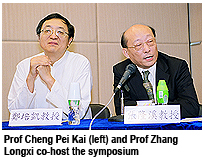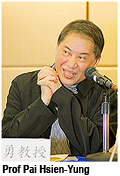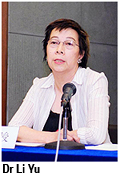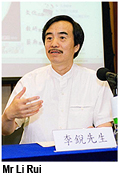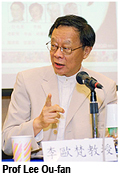Literary masters shed light on the tradition and development of Chinese creative writing
Grace Ho
Professor Cheng Pei Kai, CCIV Director, and Professor (Chair) Zhang Longxi, Director of CityU’s Centre for Cross Cultural Studies, co-hosted the symposium, and the distinguished panel consisted of Professor Pai Hsien-Yung, celebrated Chinese writer and Emeritus Professor of the University of California at Santa Barbara; Professor Lee Ou-fan, Professor of Humanities at the Chinese University of Hong Kong; Dr Li Yu, a renowned writer from New York University; Mr Li Rui, a respected novelist from Shanxi Province in mainland China; Professor N G D Malmqvist, Emeritus Professor from the University of Stockholm who has served as an adjudicator for the Nobel Prize for Literature; Professor Leung Ping-kwan, Head of Department of Chinese, Lingnan University; Mr Chen Ying-chen, a well-known Taiwanese writer; Professor Chung Ling, Dean of Faculty of Arts, Hong Kong Baptist University; Mr Huang Zi Ping, Associate Professor in the Department of Chinese Language and Literature, Hong Kong Baptist University; and Professor Liu Zai Fu, literary critic and currently Honorary Professor in CCIV.
“For over a century, the ultimate concern for
In response to the recent trend that sees Chinese creative writers writing in English so as to conform to international practice, Mr Li stressed the importance
of working in Chinese. “For over a century, we have regarded tradition as a lofty mountain, as tall as Mt. Everest, the highest point on earth. But now if we want to scale new heights, the ideal way is to return to creative writing at the sea level.” Abolishing Chinese words and characters was dangerous, he added. “I will insist on using Chinese ideogram characters to express myself.”Mr Chen pointed out that the problem of de-Sinicization, the disrespect of cultural tradition, was becoming “deplorable”, while Professor Pai criticized the way political power was being used to replace the
The symposium concluded that under the influence of globalization the problem of how to deal with national cultural traditions concerns all Chinese people.
The next generation of Chinese writing will go multi-media and writers will use different media to express their creativity, Professor Lee said.“Creative writing must be oriented towards life itself instead of concepts or markets or whatever passing fads or trends,” Professor Liu stressed.

